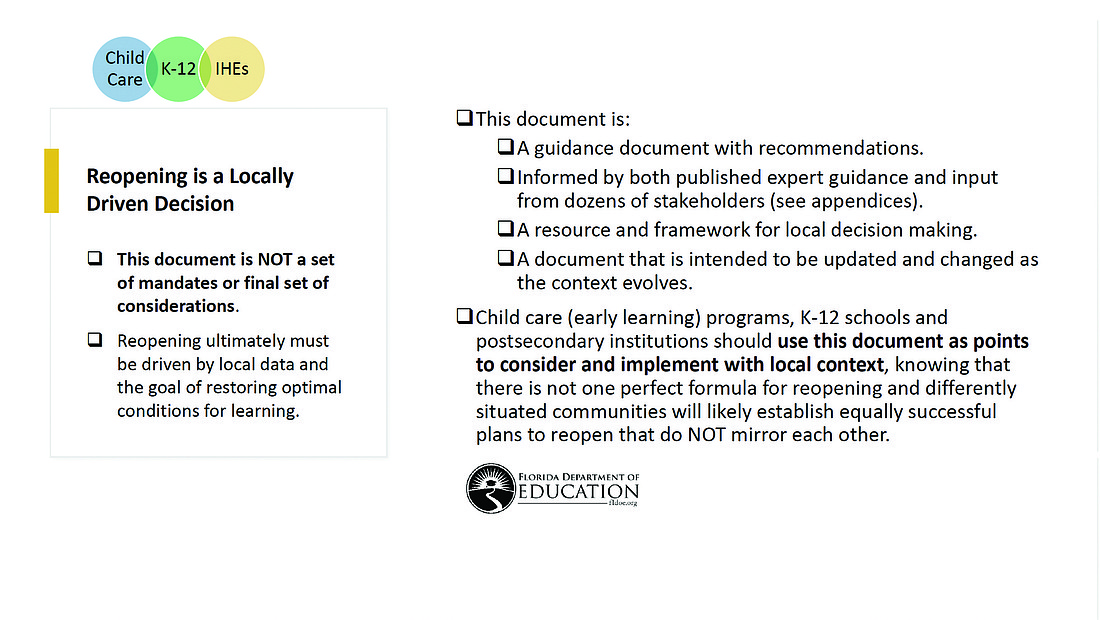- October 21, 2024
-
-
Loading

Loading

Of all the challenges of COVID-19 for state governments, surely reopening public schools — from pre-K to the universities — is one of the most complicated in terms of the scope and multitude of details and facets, the possible scenarios to anticipate and the costs.
This is a state-managed operation that involves 67 county school boards and their 335 board members, 3,650 public schools, 5.64 million students and 344,300 faculty, support and administrative staff members. And let’s not forget the millions of parents who are concerned about what happens to their children at school and the taxpayers whose money supports these important institutions.
Suffice it to say reopening Florida’s schools safely and effectively is a daunting task. Everyone will be watching this intently; the stakes are enormous for our future.
For instance, we won’t know for months, perhaps years, after schools reopen the deleterious educational effects this year’s school shutdowns will have had on the students, as well as the psychological and social effects on the families forced to navigate through the shutdowns.
The demographics of Florida’s public school students alone give you a small sense of the scope:
With that as a backdrop, virtually everyone in education knows much of the next year or two will be devoted to making up for lost time, especially for those students at the low end of the economic scales.
So imagine being Gov. Ron DeSantis and Florida Education Commissioner Richard Corcoran. Imagine the two of them looking at each other and saying, “Now what do we do?”
Last Thursday, June 11, Floridians learned what they’ve decided to do. DeSantis and Corcoran released a 143-page “Reopening Florida’s Schools and CARES Act, Closing Achievement Gaps and Creating Safe Spaces for Learning.” (Click here for the full report.)
It’s bold. Not because it mandates or recommends anything revolutionary or extreme. It’s bold precisely because it lacks mandates. It’s bold because it recognizes that the reopening of schools should be governed at the local level, not from the top down. As DeSantis learned in the managing of COVID-19, one size, one way does not fit all. Indeed, look at the accompanying box above, which explicitly states: “Reopening is a locally driven decision.”
If you’re inclined to read the document, we would direct you especially to parts one and two of the four-part reopening plan. These two parts are most relevant to the specifics of reopening schools. They also are the most well written and crafted, especially for a government document.
The first part — “The Impacts on Achievement Gaps” — makes the compelling economic and social cases for why it’s so important to reopen the schools. Worth noting:
These are just two of the many social costs of school shutdowns.
Part two of the plan — “Guidance for Reopening Healthy Learning Environments” — is a model road map and framework for every district and school.
What should strike you is how it lives up to the statement: “This document is NOT a set of mandates or final set of considerations.” You won’t find the dictatorial words “must have” or “shall implement.”
Instead, the plan says “reopening will require locally driven strategies with guidance” from the state. The second part contains 44 pages of common sense and detailed recommendations that address every part of a school day — from before students arrive to when they leave, including what to do if a student becomes infected with the coronavirus.
A sampling:
This is as it should be — shifting responsibilities to the districts and each school.
We hope in Manatee and Sarasota counties, the school boards take the same approach as DeSantis and Corcoran.
Don’t micromanage; don’t get involved in the specific steps to reopen.
Use the “Signs of Success” as the objectives, and let the superintendents and their staffs implement the reopenings.
Likewise, Sarasota interim Superintendent Mitsi Corcoran (and her permanent replacement, likely coming on board in July) and Manatee Superintendent Cynthia Saunders should do the same: Delegate down to the principals, who in turn would engage their staffs and, most notably, the students’ parents.
This is a time when parents will be on high alert. It’s also a time when they should be involved in their children’s education and schools as never before — involved as helpers, not complainers, adjusting to and being flexible in making school reopening a success.
The next few months especially and throughout the next school year will be a time of constant testing — testing what works and what doesn’t. Individual schools will find what works and will prove, as we all know, that success often comes from the bottom, not the top.
DeSantis and Corcoran have created a framework, detailed recommendations and the signs for success. They have given what local school leaders have always wanted: the freedom to do what works at the local level.
Let’s hope that philosophy filters all the way through the school boards. This is how government should work.